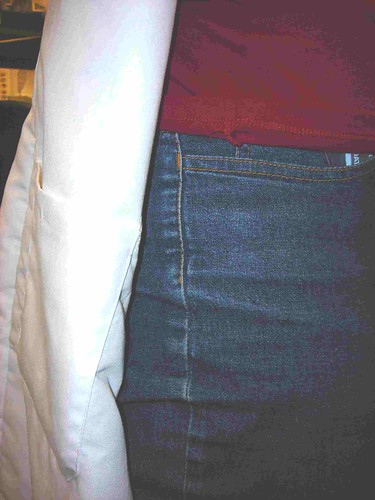In which I determine that the married state has many advantages.
Tuesday:
6 am: Mr. S hugs me goodbye. Respond 'Mrrrrrffflll ehh.' Go back to sleep.
9 am: Wake up. Look out window. Lay in bed, bitter that tea does not make itself and the Contractual Tea-Maker is away. Eventually, get up and make tea.
12:30 pm: Go to work. Hate work. Pout because there's no-one to whom to complain.
8:15 pm: Finally leave work, sulking because dinner does not make itself and the Provider of Hot Dinners After Working Late is away. Eat leftovers.
8:45 pm-9:00 pm: Enjoy having a little time to myself.
9 pm: Decide time-to-myself has grown old and I want Mr. S back. Pout.
9:30-11 pm: Watch Buffy.
11:30: Go to bed. Sulk some more. Have strange dreams about planes full of soybeans and vampires and LB plates falling into lakes.
It's a good thing we only do this twice a year.
Wednesday, May 30, 2007
Monday, May 28, 2007
Committees, Joy Of
After the feedback-meeting fiasco, our program director engaged in a flurry of documentation and clarification. We have received three lengthy and detailed messages from her on What We Must Do. The second one lays out useful feedback! From committees! Things we want to know! That they never tell us! Fascinating things like:
I am a fifth-year. My committee is no longer responsible for my reading habits. And if I lack technical competence at this point... it's beyond help. Or at least: beyond their help. But more importantly, they do not see any of these things happening (with the possible exception of critical thinking). I am in a lab 300 days a year, and they see me one day a year.
I predict this will inspire post-meeting rage, despair, and reading of job ads.
***
I wrote this before my last committee meeting. Behold! I have oracular skills. It happened just as I predicted.
Why are all our committees run by monkeys?
- When will I graduate?
- Do I have a publishable story?
- Should I switch projects?
- What do I have to do before next year to remain in good standing?
- Do you agree with my thesis outline? If not, why?
- Knowledge of the literature
- Critical thinking
- Demonstrating initiative
- Motivation and work ethic
- Technical competence
I am a fifth-year. My committee is no longer responsible for my reading habits. And if I lack technical competence at this point... it's beyond help. Or at least: beyond their help. But more importantly, they do not see any of these things happening (with the possible exception of critical thinking). I am in a lab 300 days a year, and they see me one day a year.
I predict this will inspire post-meeting rage, despair, and reading of job ads.
***
I wrote this before my last committee meeting. Behold! I have oracular skills. It happened just as I predicted.
Why are all our committees run by monkeys?
Friday, May 25, 2007
Friday 'Beat Head Here'
I have no Library for you today. Why, you ask?
Because I went to bed at 2 AM. And why is this, you ask?
Because our lovely friends Mirele and Yossi, who are visiting for the week, were robbed at gunpoint last night! The little charmers got away with two wallets and Mirele's wedding ring. And once we were done dispensing tea and calling a variety of alarmingly chipper institutions, it was rather late.
In this town, each person has a one in ten chance of being robbed in any given year. Why yes, the crime rate is appalling! To be fair, so are the poverty rate and the graft-and-embezzlement rate.
To put a cap on an already wonderful day, I woke up this morning- later this morning- to find that the phone and internet were out. Again.
***
(Later, in my inbox):
Dear Jenny,
I love you.
Mom
Because I went to bed at 2 AM. And why is this, you ask?
Because our lovely friends Mirele and Yossi, who are visiting for the week, were robbed at gunpoint last night! The little charmers got away with two wallets and Mirele's wedding ring. And once we were done dispensing tea and calling a variety of alarmingly chipper institutions, it was rather late.
In this town, each person has a one in ten chance of being robbed in any given year. Why yes, the crime rate is appalling! To be fair, so are the poverty rate and the graft-and-embezzlement rate.
To put a cap on an already wonderful day, I woke up this morning- later this morning- to find that the phone and internet were out. Again.
***
(Later, in my inbox):
Dear Jenny,
I love you.
Mom
Tuesday, May 22, 2007
I Could Have Gotten A PhD On The Internet
Or: Why Not To Go To Snooty U
(Also, Why MD/PhDs Mostly Get Them For The Wrong Reasons)
***
A dear little naïve undergrad is in the lunch room.
NI: I could get an MD in Canada in three years! And then get a PhD in Europe.
Me: Why?
NI: It's faster. Only three years.
Me: European PhDs are largely considered equivalent to being a fourth-year grad student.*
NI: But it's faster!
Me: So why do you want a PhD anyways?
NI: So I can do research!
Me: Ah. So you want to do research, but you don't want to be trained for research.
NI: Well, after working here, I feel like it would just be more of the same!
Me: [Of course. We don't learn anything in grad school. It's just like having your hand held on an undergrad project, five hours a week. What was I thinking? I could have three doctorates by now!] ...Ah.
*For bachelor's-to-PhD programs. Having a Master's or a couple years extra labwork evens it out. But honestly, most of the European bio PhDs** I've met know as much as I did two years ago. Because experience is good for something. And yes, if the unis here were motivated, we could learn almost as much in five years, and then graduate. But slave labor, you see, is cheap.
**But I'm willing to believe perhaps my sample is biased.
(Also, Why MD/PhDs Mostly Get Them For The Wrong Reasons)
***
A dear little naïve undergrad is in the lunch room.
NI: I could get an MD in Canada in three years! And then get a PhD in Europe.
Me: Why?
NI: It's faster. Only three years.
Me: European PhDs are largely considered equivalent to being a fourth-year grad student.*
NI: But it's faster!
Me: So why do you want a PhD anyways?
NI: So I can do research!
Me: Ah. So you want to do research, but you don't want to be trained for research.
NI: Well, after working here, I feel like it would just be more of the same!
Me: [Of course. We don't learn anything in grad school. It's just like having your hand held on an undergrad project, five hours a week. What was I thinking? I could have three doctorates by now!] ...Ah.
*For bachelor's-to-PhD programs. Having a Master's or a couple years extra labwork evens it out. But honestly, most of the European bio PhDs** I've met know as much as I did two years ago. Because experience is good for something. And yes, if the unis here were motivated, we could learn almost as much in five years, and then graduate. But slave labor, you see, is cheap.
**But I'm willing to believe perhaps my sample is biased.
Monday, May 21, 2007
You Know You've Been In Lab Too Much...
...when you schedule a 7-hour prep for Wednesday, then realize at 11 pm that 1) Wednesday is a religious holiday and 2) you'll have houseguests.
...when you can't remember what day of the week it is, because it's always time for lab.
... and most of all, when you pick up a foil-covered casserole dish and look around for the autoclave tape.*
*To make sure the chicken gets properly sterilized, of course.
...when you can't remember what day of the week it is, because it's always time for lab.
... and most of all, when you pick up a foil-covered casserole dish and look around for the autoclave tape.*
*To make sure the chicken gets properly sterilized, of course.
Friday, May 18, 2007
Friday Library: In Which I Am Cheerful (For A Change)
To counteract my mood of Doomful Gloom, I give you: Things That Make Me Happy.
***
Walking in the woods


with my favorite hat.
Swamps


Light on the water and bright trees.


Gardening in pots- my radishes, and someone's daisies.
![]()

And, of course, flowers.


Love-lies-bleeding.


Lilacs and rhododendrons.


Something very yellow, and pinks.


Lilies-of-the-valley and a late tulip.
Yellow rhododendrons (!) and wisteria.


An impressionist view of a dogwood, and the anatomy of a double tulip.
Happy weekend, all!
***
Walking in the woods


with my favorite hat.
Swamps


Light on the water and bright trees.


Gardening in pots- my radishes, and someone's daisies.

And, of course, flowers.


Love-lies-bleeding.


Lilacs and rhododendrons.


Something very yellow, and pinks.


Lilies-of-the-valley and a late tulip.
Yellow rhododendrons (!) and wisteria.


An impressionist view of a dogwood, and the anatomy of a double tulip.
Happy weekend, all!
Wednesday, May 16, 2007
Professional Frustrations; Also, Why People Pay For Translators
Editing! It has untold joys. Our journal, for a variety of unpleasant reasons, has not yet published the second issue of the year. What year would that be? Why, 2006! Four complete issues with copyrights are waiting in the queue. Backlog? What backlog?
So the other editor in chief and I asked the office which funds us, would it be a possiblity to get money for a freelancer, just for a couple weeks, to catch up to 2007? It now being May. Of 2007. And angry emails from authors accumulating daily.
Instant hysteria on the part of our paid staff members. Furious and condescending emails to the other EIC and myself! How dare we ask a question without asking his permission first! It must never happen again! Bad, bad editors! No biscuit!
Excuse me while I go bang my head against the wall for a while. For insulting, destructive condescension, I have my advisor! Isn't that enough?
***
My sweet adorable spouse, in a fit of industry combined with thesis-writing (oh, the things people will do to avoid writing a thesis), decided a to cook a World Corruption Index dinner every week for Shabbat dinner. He's started at the bottom of this.
Anyhow, the next one is Ivory Coast. I looked up recipes for him last night, since Ivoiriens speak French and all. Without further ado, I present you BabelFish's translation, in the hope it will bring you as much joy as it brought me. Turns out? Not easier than translating it myself.
P.P.S. And no milk either.
So the other editor in chief and I asked the office which funds us, would it be a possiblity to get money for a freelancer, just for a couple weeks, to catch up to 2007? It now being May. Of 2007. And angry emails from authors accumulating daily.
Instant hysteria on the part of our paid staff members. Furious and condescending emails to the other EIC and myself! How dare we ask a question without asking his permission first! It must never happen again! Bad, bad editors! No biscuit!
Excuse me while I go bang my head against the wall for a while. For insulting, destructive condescension, I have my advisor! Isn't that enough?
***
My sweet adorable spouse, in a fit of industry combined with thesis-writing (oh, the things people will do to avoid writing a thesis), decided a to cook a World Corruption Index dinner every week for Shabbat dinner. He's started at the bottom of this.
Anyhow, the next one is Ivory Coast. I looked up recipes for him last night, since Ivoiriens speak French and all. Without further ado, I present you BabelFish's translation, in the hope it will bring you as much joy as it brought me. Turns out? Not easier than translating it myself.
To prepare chickens: to empty and flame them. To clean meat offals carefully. In a pan, to make cook during 10 hearts minutes and livers with water salted, scented of a sheet of bay-tree and branches thyme. To finely chop the piece of boiled ox, the hearts and the livers then onion. To add the bread soaked in milk and drained, as well as the powder of peanut. To bind egg, to salt, pepper, then to mix well with a spoon out of wooden. To powder of a pinch with grated nutmeg. To fill chickens of the scented mince and to sew them nothing to let escape. In a casserole, oval preferably, to pour oil and make gild chickens on all the faces. To make heat the bubble and sprinkle the gilded poultries with it. To leave simmer. Cooking is finished when the meat became tender. To then serve chickens in a dish that one can furnish with salads or sections of plantains.P.S. Not really ox. In case you were worrying. Also, no bubbles will be harmed.
P.P.S. And no milk either.
Monday, May 14, 2007
Conduct Code of Scientific Uniform
This is what I wear every day: jeans, knit shirt; khakis, polo shirt; knit shirt, denim knee-length skirt. Oxford shoes. Earrings. Lab coat. Nothing too nice.


And this is the dress I just sewed in a fit of nostalgia for girly, frilly clothing. The ruffler attachment and I had a fine time.
On the one hand, every work place has a dress code. Bankers wear suits. Nurses wear scrubs (or slacks and a shirt). Business-casual workers wear khakis and a nice shirt, and so on. To some extent, these acceptable categories are narrowly defined, unless one is in California or some similarly enlightened place. (Or in a more, shall we say, accepting academic environment.)
On the other hand, I have never seen any of our female faculty wear other than: shirtdresses; slacks and a blouse; slacks or skirt and a sweater. And I saw one wear a suit once.
If I wore this dress to lab, it would destroy whatever credibility I have left in my coworkers' eyes. One mustn't be too frilly, after all. Why? Well, in my experience, some of it is because, as I've said before, feminine is equated with not-serious-about-work. A floral skirt means you were thinking about clothing rather than science that morning. And so on.
But some of it is legitimate. Stiletto heels are not appropriate for treating indigent patients at the free clinic. Flouncy dresses will, inevitably, knock over the pipettes' bleach bath.
I think part of this attitude springs from- I don't quite know how to express it- expecting women to pretend to be men. Heaven forbid you should wear anything with lace at the hem. It doesn't project tough and in charge, which, at least around here, is what one needs to succeed.
Where does pretty clothing become truly inappropriate for work? Other than the obvious: stilettos and feathered headdresses. So where's the line?


And this is the dress I just sewed in a fit of nostalgia for girly, frilly clothing. The ruffler attachment and I had a fine time.
On the one hand, every work place has a dress code. Bankers wear suits. Nurses wear scrubs (or slacks and a shirt). Business-casual workers wear khakis and a nice shirt, and so on. To some extent, these acceptable categories are narrowly defined, unless one is in California or some similarly enlightened place. (Or in a more, shall we say, accepting academic environment.)
On the other hand, I have never seen any of our female faculty wear other than: shirtdresses; slacks and a blouse; slacks or skirt and a sweater. And I saw one wear a suit once.
If I wore this dress to lab, it would destroy whatever credibility I have left in my coworkers' eyes. One mustn't be too frilly, after all. Why? Well, in my experience, some of it is because, as I've said before, feminine is equated with not-serious-about-work. A floral skirt means you were thinking about clothing rather than science that morning. And so on.
But some of it is legitimate. Stiletto heels are not appropriate for treating indigent patients at the free clinic. Flouncy dresses will, inevitably, knock over the pipettes' bleach bath.
I think part of this attitude springs from- I don't quite know how to express it- expecting women to pretend to be men. Heaven forbid you should wear anything with lace at the hem. It doesn't project tough and in charge, which, at least around here, is what one needs to succeed.
Where does pretty clothing become truly inappropriate for work? Other than the obvious: stilettos and feathered headdresses. So where's the line?
Friday, May 11, 2007
Friday Blather: 'Had It' Edition
- All the normal wit and wisdom of which I am possessed (that is to say, very little) is lost in a fog of exhaustion.
- But my horrid, horrid experiment finally worked.
- I think.
- Did I mention that I have a mild number dyslexia? Difficult when doing long series of calculations.
- My sweet spouse takes care of a lot of things for me so I don't get stressed. Heaven forbid I ever have to do them all myself.
- To wit: Internet at home! Oh, the joy.
- When offered the choice between:
- Presenting a failed experiment and being called 'technically incompetent'
- Not mentioning the failed experiment and being called 'unmotivated and nonproductive'
- Lying
- Screaming and throwing things
(Actual choice: Smoke and mirrors. 'Look at the pretty graph! With lines! Oooh, look here, a gel.' Thinking up serious spin for everything is... er... exhausting is one word for it.)
Wednesday, May 09, 2007
Ask A Scientist: Male-Mediated Teratogenesis (and Bupropion)
A correspondent asks: "What are the risks and possible side effects of long-term usage of bupropion in terms of sperm genetic abnormalities?" (In other words, "Do I need to worry that my husband is taking Wellbutrin?" and "Does Wellbutrin harm sperm? Does it affect fertility? Does it cause genetic problems?")
Well, speaking from a scientific standpoint, there's no evidence that bupropion causes DNA damage in any way; bupropion doesn't even cause so-called 'congenital' defects. (Congenital usually means not genetic, but rather caused by environmental or unknown factors.) So probably, bupropion does nothing to sperm.
To broaden the question, what is known about teratogenesis- physical but not genetic changes- caused by sperm abnormalities?
This is a very hard question to study. Any male-mediated effect usually has weaker effects than when female-mediated: a mother's dioxin exposure is more harmful than a father's.* For example, moderate male lead exposure doesn't appear to be associated with birth defects in future offspring, but maternal exposure causes neural tube defects and other nasty things.
Why? The sperm:egg volume ratio is something like 1:1000, so the metabolic organelles are almost all maternally contributed. Only DNA damage (whether direct or 'epigenetic', i.e., non-permanent) in sperm would have an effect on fetal development. That is: if there's something non-genetic wrong with the egg, or if that particular egg is wonky in some way, it can have a huge effect. Not so much with the sperm, because it's mostly a bundle of DNA with a tail attached. Or think of it this way: the father is contributing 23 chromosomes and maybe a mitochondrion, and the mother is contributing everything else. For nine months. Which one do you think matters more? So teratogens have much more severe effects in the female than the male.
(To return briefly to bupropion: lead is a LOT nastier than bupropion. I wouldn't worry about ADs. Really.)
(Also, to digress: women who are breastfeeding often fear drinking. But calculate it out: if your BAC is 0.1%, which is equal to really drunk, then the milk has 0.1% alcohol in it too. Therefore it is 0.2 proof. Like a beer diluted 50 times. This is 2/5 of a cup of beer in a gallon of water. Yeah! That's a lot!!! Similarly, the plasma concentration of the drug is usually equal to the milk concentration, i.e. the breastfeeding child gets some very low percentage of the dose. This is why doctors who categorically refuse to prescribe to breastfeeding women are, in my personal opinion, IDIOTS.)
What if something causes DNA damage in sperm but not eggs- what if there's a drug women use and it's fine, but it's bad for male reproduction? It's theoretically possible- the cell division processes that generate gametes (meiosis) are somewhat different. But it's not likely, because really they're quite similar. (If anyone has a counter-example, please send it.)
It's also possible that nonpermanent genetic changes, which are called epigenetic modifications, are caused by a lot of things. This is really, really hard to study too. If anyone really wants to know why, I can write about it later, but take my word for it.
It's widely thought that many miscarriages are caused by genetic abnormalities. But most drugs don't cause genetic abnormalities, for the simple reason that if they do, they'll raise your rate of cancer (among other things) and be pulled from the market. So sperm-contributed mutations are generally from chance, combined with an inherent error rate in DNA replication, and with the caveat that the error rate may increase with age.** Sometimes from environmental exposure to really nasty stuff, too.***
Interestingly enough, even thalidomide- the stereotypical Bad Scary Teratogenic Drug- caused only 20-30% malformations, and that only when taken between d34 and d50 (i.e. in the second month) by the mother. Motherisk points out that 'When asked, even women exposed to nonteratogenic drugs believe they have a 25% risk of having children with major malformations, apparently the size of the risk with thalidomide itself. This unrealistic perception leads pregnant women to avoid medications even when they clearly need them.' In other words: look at the evidence before freaking out about drugs; it's probably not as bad as you think.
All this aside, there are many chemicals thought to harm sperm - but note that many of their first-line effects are reduced sperm count and motility.
Overall, biologically speaking, there's no evidence that bupropion (Wellbutrin) causes harm to sperm in any way. This doesn't mean it absolutely doesn't under any circumstances, but viewing it scientifically, it is extremely unlikely that the drug is harmful to men or women or fetuses.
*This paper discusses increased risks, but doesn't differentiate well between maternal and paternal exposure- they have historically been quite difficult to assess and track in Vietnam. Take-home message: self-reporting is unreliable, and dioxin is not good for humans. Here's a more careful study. Correlation is not causation.
**This theory, which I so don't have time to go into, has also to do with why the cancer risk increases dramatically with age. In general, all systems degenerate entropically over time. Including the human body.
** But here's a really poorly researched paper on Scary! Bad! Everything. Anecdotal, non-prospective and non-tracking evidence is notoriously bad. I'm just saying.
Well, speaking from a scientific standpoint, there's no evidence that bupropion causes DNA damage in any way; bupropion doesn't even cause so-called 'congenital' defects. (Congenital usually means not genetic, but rather caused by environmental or unknown factors.) So probably, bupropion does nothing to sperm.
To broaden the question, what is known about teratogenesis- physical but not genetic changes- caused by sperm abnormalities?
This is a very hard question to study. Any male-mediated effect usually has weaker effects than when female-mediated: a mother's dioxin exposure is more harmful than a father's.* For example, moderate male lead exposure doesn't appear to be associated with birth defects in future offspring, but maternal exposure causes neural tube defects and other nasty things.
Why? The sperm:egg volume ratio is something like 1:1000, so the metabolic organelles are almost all maternally contributed. Only DNA damage (whether direct or 'epigenetic', i.e., non-permanent) in sperm would have an effect on fetal development. That is: if there's something non-genetic wrong with the egg, or if that particular egg is wonky in some way, it can have a huge effect. Not so much with the sperm, because it's mostly a bundle of DNA with a tail attached. Or think of it this way: the father is contributing 23 chromosomes and maybe a mitochondrion, and the mother is contributing everything else. For nine months. Which one do you think matters more? So teratogens have much more severe effects in the female than the male.
(To return briefly to bupropion: lead is a LOT nastier than bupropion. I wouldn't worry about ADs. Really.)
(Also, to digress: women who are breastfeeding often fear drinking. But calculate it out: if your BAC is 0.1%, which is equal to really drunk, then the milk has 0.1% alcohol in it too. Therefore it is 0.2 proof. Like a beer diluted 50 times. This is 2/5 of a cup of beer in a gallon of water. Yeah! That's a lot!!! Similarly, the plasma concentration of the drug is usually equal to the milk concentration, i.e. the breastfeeding child gets some very low percentage of the dose. This is why doctors who categorically refuse to prescribe to breastfeeding women are, in my personal opinion, IDIOTS.)
What if something causes DNA damage in sperm but not eggs- what if there's a drug women use and it's fine, but it's bad for male reproduction? It's theoretically possible- the cell division processes that generate gametes (meiosis) are somewhat different. But it's not likely, because really they're quite similar. (If anyone has a counter-example, please send it.)
It's also possible that nonpermanent genetic changes, which are called epigenetic modifications, are caused by a lot of things. This is really, really hard to study too. If anyone really wants to know why, I can write about it later, but take my word for it.
It's widely thought that many miscarriages are caused by genetic abnormalities. But most drugs don't cause genetic abnormalities, for the simple reason that if they do, they'll raise your rate of cancer (among other things) and be pulled from the market. So sperm-contributed mutations are generally from chance, combined with an inherent error rate in DNA replication, and with the caveat that the error rate may increase with age.** Sometimes from environmental exposure to really nasty stuff, too.***
Interestingly enough, even thalidomide- the stereotypical Bad Scary Teratogenic Drug- caused only 20-30% malformations, and that only when taken between d34 and d50 (i.e. in the second month) by the mother. Motherisk points out that 'When asked, even women exposed to nonteratogenic drugs believe they have a 25% risk of having children with major malformations, apparently the size of the risk with thalidomide itself. This unrealistic perception leads pregnant women to avoid medications even when they clearly need them.' In other words: look at the evidence before freaking out about drugs; it's probably not as bad as you think.
All this aside, there are many chemicals thought to harm sperm - but note that many of their first-line effects are reduced sperm count and motility.
Overall, biologically speaking, there's no evidence that bupropion (Wellbutrin) causes harm to sperm in any way. This doesn't mean it absolutely doesn't under any circumstances, but viewing it scientifically, it is extremely unlikely that the drug is harmful to men or women or fetuses.
*This paper discusses increased risks, but doesn't differentiate well between maternal and paternal exposure- they have historically been quite difficult to assess and track in Vietnam. Take-home message: self-reporting is unreliable, and dioxin is not good for humans. Here's a more careful study. Correlation is not causation.
**This theory, which I so don't have time to go into, has also to do with why the cancer risk increases dramatically with age. In general, all systems degenerate entropically over time. Including the human body.
** But here's a really poorly researched paper on Scary! Bad! Everything. Anecdotal, non-prospective and non-tracking evidence is notoriously bad. I'm just saying.
Monday, May 07, 2007
Updating
Whilst switching templates, the blogroll is taking a vacation to Tahiti. I hope it will all return shortly. It may be not-so-shortly.
Let Us Now Praise
Let us now praise ones of renown and our forebears in their generation.
I am blessed to have wonderful, normal, sane parents. Over the last years, I have met so many people whose parents are abusive, neglectful, mean, controlling, strange, mentally unbalanced, or a host of other things. I've seen friends deal with the various ways their parents' problems make their lives more complicated, and try to fight their ways out of nasty old habits. It looks terrible and hard.
My father's family is fairly well-adjusted. Grandpa died when Dad was eighteen; they had to sell the farm, and Nanna worked three jobs to put her kids through college. My mother's family is a mess. Her father... well, I've never met him and don't know his name.
And coming from this? Mom stayed home and made us cookies after school, and taught us to sew and find journal articles and do science research. Dad taught us to change tires, solder, do carpentry, fix plumbing, garden, drive, read Sherlock Holmes, and appreciate Jimi Hendrix. We took art classes, ran around at the river, looked at pond ooze under microscopes, volunteered with the homeless, and got very grubby indeed. We had a dog and a garden and kittens.
They taught me responsibility, caring, service, and enough practical skills to skin a horse with. They love me whatever my choices, and they respect my choices. I love them a great deal, and I also think they did a damn good job at parenting. They have always let me make my own mistakes. I had no idea how rare and valuable this is.
Every time I hear someone tell me how her father called her a 'parasite', or how his cousin mocks him in front of the family, or how her mother discourses on the wrongness of her every little decision, or how her mother abandoned her with strangers in Kansas*, I am sad that any child (and adult) would have to endure this. I am heartbroken to hear that parents could treat their children so.
And every time, I am that much more grateful for my own family.
*True story.
I am blessed to have wonderful, normal, sane parents. Over the last years, I have met so many people whose parents are abusive, neglectful, mean, controlling, strange, mentally unbalanced, or a host of other things. I've seen friends deal with the various ways their parents' problems make their lives more complicated, and try to fight their ways out of nasty old habits. It looks terrible and hard.
My father's family is fairly well-adjusted. Grandpa died when Dad was eighteen; they had to sell the farm, and Nanna worked three jobs to put her kids through college. My mother's family is a mess. Her father... well, I've never met him and don't know his name.
And coming from this? Mom stayed home and made us cookies after school, and taught us to sew and find journal articles and do science research. Dad taught us to change tires, solder, do carpentry, fix plumbing, garden, drive, read Sherlock Holmes, and appreciate Jimi Hendrix. We took art classes, ran around at the river, looked at pond ooze under microscopes, volunteered with the homeless, and got very grubby indeed. We had a dog and a garden and kittens.
They taught me responsibility, caring, service, and enough practical skills to skin a horse with. They love me whatever my choices, and they respect my choices. I love them a great deal, and I also think they did a damn good job at parenting. They have always let me make my own mistakes. I had no idea how rare and valuable this is.
Every time I hear someone tell me how her father called her a 'parasite', or how his cousin mocks him in front of the family, or how her mother discourses on the wrongness of her every little decision, or how her mother abandoned her with strangers in Kansas*, I am sad that any child (and adult) would have to endure this. I am heartbroken to hear that parents could treat their children so.
And every time, I am that much more grateful for my own family.
*True story.
Friday, May 04, 2007
Friday Library: Socialist Universities?
The Dead Professors Library returns! This bit below is probably the most sensible page in the whole pamphlet. Why did this guy have this book????
Some of it is certainly echoed in today's universities. Some of it is pure propaganda (wait 'til I show you the bits about politics in science!), but is education over-commercialized now? Is expertise valued above experience? Discuss.
****
Strive to Build a Socialist University of Science and Engineering
by the Workers' and People's Liberation Army Men's Mao Tsetung Thought Propaganda Team at Tsinghua University
Foreign Languages Press
Peking, 1972
Smash Slavish Comprador Philosophy and Doctrine of Trailing Behind at a Snail's Pace, Compile New Proletarian Teaching Material
The transformation of teaching material is a serious political struggle. It is a question of vital importance to the bringing up of a generation of new people. The slavish comprador philosophy and the doctrine of trailing behind at a snail's pace constitute the very core of the old system of the teaching material for colleges of science and engineering. They pervade every line of the teaching material. Today, they are still the yoke shackling the minds of a small number of intellectuals. Thus to eradicate the slavish comprador philosophy and the doctrine of trailing behind at a snail's pace is the key to thoroughly transforming the teaching material.
'A given culture is the ideological reflection of the politics and economics of a given society.' (On New Democracy.) Though in content they deal with natural sciences, the textbooks in science and engineering in the imperialist and social-imperialist countries are stamped with the brand of exploiting classes, because they are summings-up of the development of science and technology made according to the bourgeois world outlook to meet their political, economic and military needs. Liu Shao-chi and company frantically trumpeted the slavish comprador philosophy of trailing behind at a snail's pace, introduced this stuff into China lock, stock and barrel, and allowed the foreign bourgeoisie to continue their dictatorship over the Chinese people through the old teaching material. Take a series of old textbooks on electronics for example. The much advertised 'compact' system for subjects in this scientific branch is nothing but an epitome of the development of electronics technology in the capitalist society. However, the textbooks claim that this system is an eternal and absolute truth and if one is to develop the electronics industry and master electronics technology one can only trail along this old road at a snail's pace. This fully reveals the slavish and backward character of the old teaching material. The old teaching material reverses history, plagiarizes inventions and creations by the labouring people and advertises 'experts above everybody else' in order to serve the interests of the bourgeoisie in monopolizing science and technology; it advertises 'theory above everything', commercializes education and artificially raises its prestige by turning simple matters into mysteries to serve the interests of the bourgeois intellectuals in ruling schools; it advertises that 'material and technical conditions decide everything', denies that man is the decisive factor and stifles the infinite creativity of the masses.
***
This week brought to you by the letters a a a a a a h and the number 6.
Some of it is certainly echoed in today's universities. Some of it is pure propaganda (wait 'til I show you the bits about politics in science!), but is education over-commercialized now? Is expertise valued above experience? Discuss.
****
Strive to Build a Socialist University of Science and Engineering
by the Workers' and People's Liberation Army Men's Mao Tsetung Thought Propaganda Team at Tsinghua University
Foreign Languages Press
Peking, 1972
Smash Slavish Comprador Philosophy and Doctrine of Trailing Behind at a Snail's Pace, Compile New Proletarian Teaching Material
The transformation of teaching material is a serious political struggle. It is a question of vital importance to the bringing up of a generation of new people. The slavish comprador philosophy and the doctrine of trailing behind at a snail's pace constitute the very core of the old system of the teaching material for colleges of science and engineering. They pervade every line of the teaching material. Today, they are still the yoke shackling the minds of a small number of intellectuals. Thus to eradicate the slavish comprador philosophy and the doctrine of trailing behind at a snail's pace is the key to thoroughly transforming the teaching material.
'A given culture is the ideological reflection of the politics and economics of a given society.' (On New Democracy.) Though in content they deal with natural sciences, the textbooks in science and engineering in the imperialist and social-imperialist countries are stamped with the brand of exploiting classes, because they are summings-up of the development of science and technology made according to the bourgeois world outlook to meet their political, economic and military needs. Liu Shao-chi and company frantically trumpeted the slavish comprador philosophy of trailing behind at a snail's pace, introduced this stuff into China lock, stock and barrel, and allowed the foreign bourgeoisie to continue their dictatorship over the Chinese people through the old teaching material. Take a series of old textbooks on electronics for example. The much advertised 'compact' system for subjects in this scientific branch is nothing but an epitome of the development of electronics technology in the capitalist society. However, the textbooks claim that this system is an eternal and absolute truth and if one is to develop the electronics industry and master electronics technology one can only trail along this old road at a snail's pace. This fully reveals the slavish and backward character of the old teaching material. The old teaching material reverses history, plagiarizes inventions and creations by the labouring people and advertises 'experts above everybody else' in order to serve the interests of the bourgeoisie in monopolizing science and technology; it advertises 'theory above everything', commercializes education and artificially raises its prestige by turning simple matters into mysteries to serve the interests of the bourgeois intellectuals in ruling schools; it advertises that 'material and technical conditions decide everything', denies that man is the decisive factor and stifles the infinite creativity of the masses.
***
This week brought to you by the letters a a a a a a h and the number 6.
Wednesday, May 02, 2007
In Which NPR Resurrects My Pet Peeve
-WHAT did they say?
-They're so good 'cause efficiency is in their DNA.
-Ooooh! They found the efficiency gene! Can I have one?
-It's a miracle of science.
-I can see it now: Toyota transfects you when you get promoted to management.
-They put a mask over your face. 'Breathe deeply, this won't hurt a bit!'
-And then their spouse comes home and the canned goods are in alphabetical order by size and they're rearranging the furniture for more ergonomic work flow.
-Better living through gene therapy.
-They're so good 'cause efficiency is in their DNA.
-Ooooh! They found the efficiency gene! Can I have one?
-It's a miracle of science.
-I can see it now: Toyota transfects you when you get promoted to management.
-They put a mask over your face. 'Breathe deeply, this won't hurt a bit!'
-And then their spouse comes home and the canned goods are in alphabetical order by size and they're rearranging the furniture for more ergonomic work flow.
-Better living through gene therapy.
Subscribe to:
Comments (Atom)

